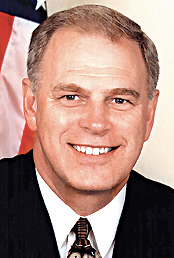Strickland’s order on pay frustrates some gay activists

Ohio Governor Ted Strickland (D-Lisbon)
The executive order for equal compensation doesn’t cover benefits.
COLUMBUS (AP) — A governor generally viewed as a supporter of the gay community sidestepped a potentially divisive issue going into next year’s presidential election.
Gov. Ted Strickland, the first Democrat elected Ohio governor in 20 years, signed an executive order in May that banned workplace discrimination in the executive branch based on sexual orientation and gender identity.
The order specifically banned state agencies from offering a “rate of compensation” that was different for gay and straight employees. But Strickland interpreted “rate of compensation” as only salary, not benefits, frustrating some in the gay community.
“It looks to me that this is more of a political judgment than it is a principled judgment,” said Marc Spindelman, an Ohio State University law professor and gay rights advocate. “It may be that the governor doesn’t want to arouse a sleeping giant.”
Spindelman’s sleeping giant is the specter of a fight over gay rights heading into the 2008 presidential election. Democrats need only to look back to 2004, when the proposed gay marriage ban was credited for helping turn out cultural conservatives whose votes swung the state to President Bush.
For their part, the gay rights-promoting Stonewall Union, while conceding Spindelman’s frustrations, is giving Strickland a break.
“We need to give our governor more time,” said Karla Rothan, Stonewall’s executive director. “We’ll see more equality than we have in the past 12 years.”
Spindelman, who is gay, argued that the Ohio Supreme Court gave Strickland the legal basis to include health benefits in his order in a pivotal ruling this summer.
The high court was asked to determine whether Ohio’s 2004 constitutional amendment banning same-sex marriage nullified the legal protections that unmarried victims of domestic abuse receive.
The unmarried victims won — but so did the gay community, said Spindelman, now a visiting law professor at the University of Michigan.
The second part of the gay-marriage ban, which says the state cannot create an institution that “approximates” marriage, means governments cannot create a “marriage substitute” that “bears all the attributes of marriage,” the court ruled.
That meant that domestic abuse protections don’t approximate marriage, so neither should health benefits for gay executive branch employees, Spindelman argued.
Spindelman and some others are eager for Strickland to test the legal limits of the ruling, but the governor isn’t interested.
Strickland issued his order before the court’s ruling and never intended for its “rate of compensation” provision to apply to domestic benefits, said Strickland spokesman Keith Dailey.
“It’s not something the governor or his staff have focused their attention on,” he said, adding the governor is primarily focused on getting a massive energy bill passed.
 43
43
